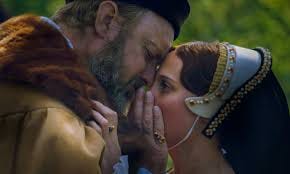Bad Tudoring
'Firebrand' works before it tries too hard to live up to its title

I’m a sucker for historical movies of just about any kind. And I’m particularly a sucker for anything having to do with the Tudors (1485-1603), the English dynasty that transformed the world by laying the foundations for the British empire. The reviews for Brazilian director Karim Aïnouz’s Fireband, which focuses on Catherine Parr, the last of the six wives of Henry VIII, were tepid at best. But I was willing to give it a chance.
Parr, skillfully portrayed by Alicia Vikander (well on her way to building a distinguished body of work), was notable for a number of reasons, not the least of which is that she actually survived her husband. She was also a published poet who not only took Henry’s three children by previous wives under her wing, but was also influential in restoring future Queens Mary and Elizabeth to the line of succession. Firebrand gins up Parr’s role still further by connecting her avowed Protestantism and associating her with Anne Askew, who staked out a more radical position in the Reformation for which she was put to death. Fine. We get it: women were important and could be involved in politics in ways that went beyond the domestic.
There were some things I really liked about Firebrand. One was the way it convincingly depicted the grime and splendor of the sixteenth-century English court. Another was the way it captured the erratic final years of Henry’s reign —he’s played with appropriate cantankerousness by an almost unrecognizable Jude Law—and the fearful infighting among factions jockeying for power as he heads toward an odiferous death. It was also fun, as a matter of inside baseball, to see figures like Stephen Gardiner (who factored prominently in Hilary Mantel’s Wolf Hall trilogy) and the Seymour siblings, brother to Henry’s third wife, Jane, who gave him the male heir he so desperately wanted before dying in childbirth, figure so prominently in this saga (Parr married Thomas Seymour after the king’s death.) Throughout Firebrand, the camera occasionally lingers on the gaze of Elizabeth (Junia Rees), who takes in all these machinations. We watch her knowing she will be the unlikely inheritor of all this, and indeed she provides the voiceover that frames the film.
And then Firebrand goes disastrously off the rails with a plot twist I didn’t see coming and won’t spoil here. (The movie is based on Elizabeth Fremantle’s 2013 novel, Queen’s Gambit.) Suffice it to say that the screenplay insists on giving Catherine agency to the point of stretching the story beyond credulity, especially since it argues that she was the inspiration for Queen Elizabeth’s religious ideology in ways that violate the historical record. Elizabeth, determined to restore stability, moved decisively to curb religious radicalism in all directions to consolidate her political power, which is one reason why the Pilgrims and Puritans came to America. There’s no need to gild this lily—or, for that matter, such powerful Tudor women, whether or not, like the men around them, they literally and figuratively lost their heads—or managed to keep them.
For history to have any meaning, it has to relate somehow to the concerns of the present, and any given history will take on the flavor of its moment—something that becomes clear as it gets reinterpreted (again and again) by later generations. Feminism is now a standard part of the mainstream movie apparatus. But the historical record isn’t infinitely plastic, either as a matter of fact or worldview. Firebrand is a reminder that you can spoil a story with bad choices that insist on overwriting the past.
